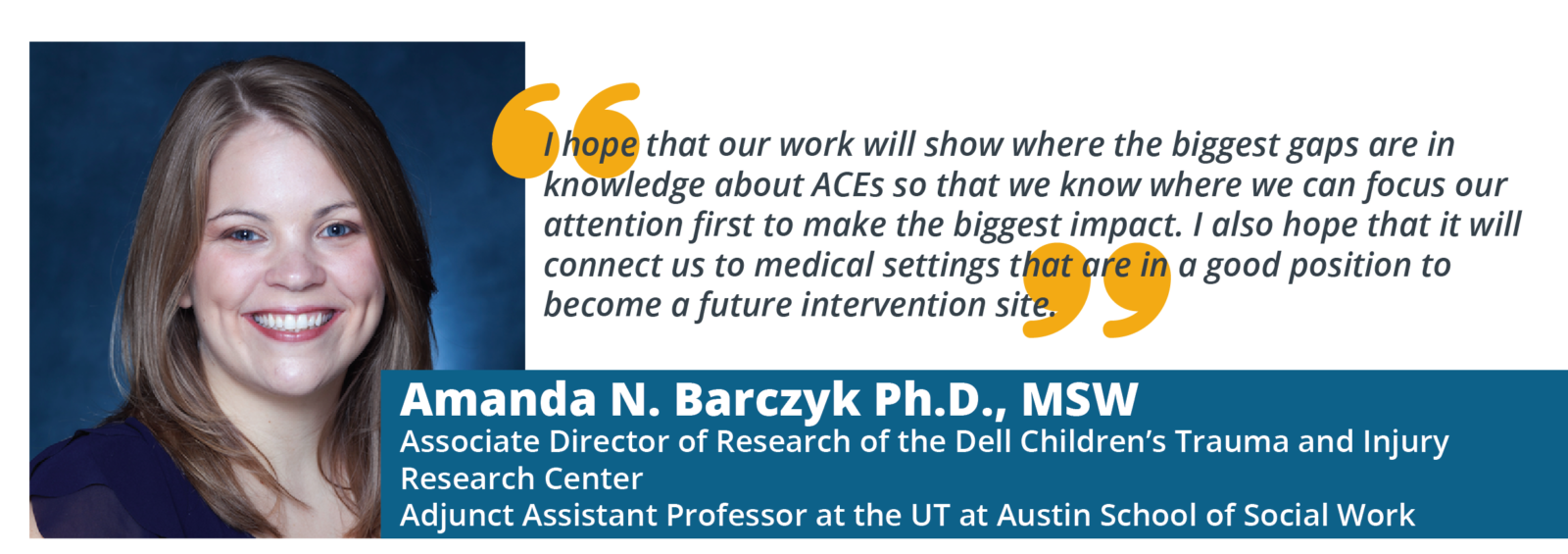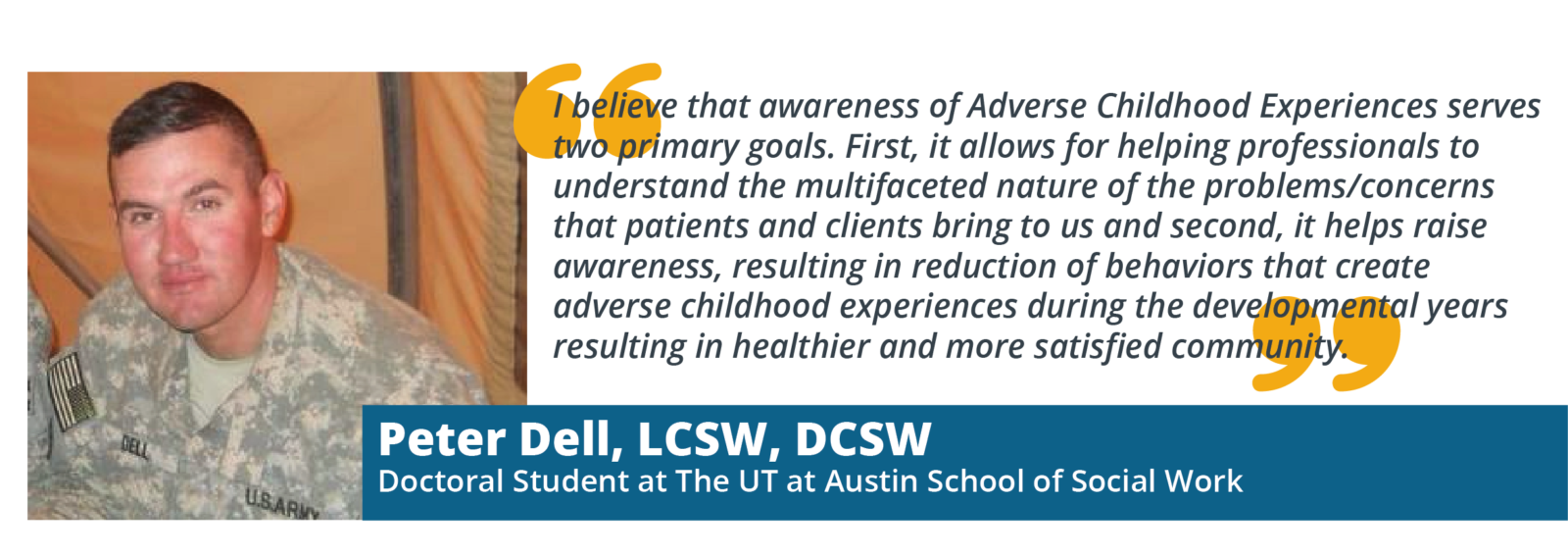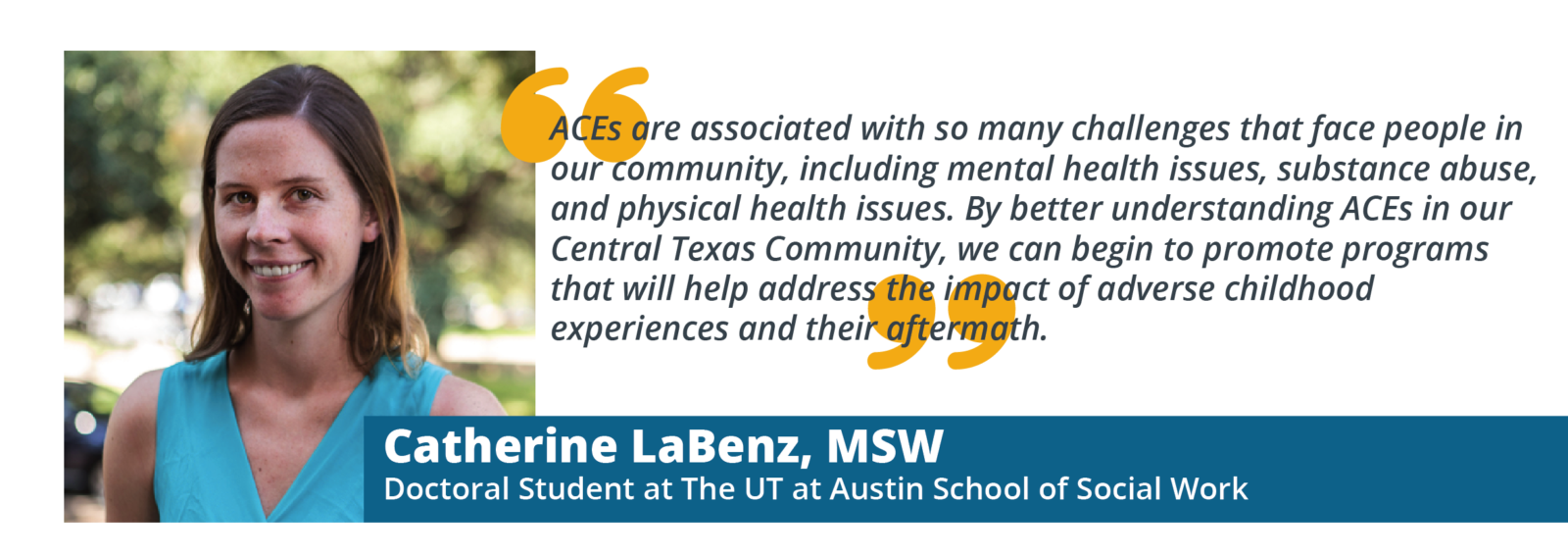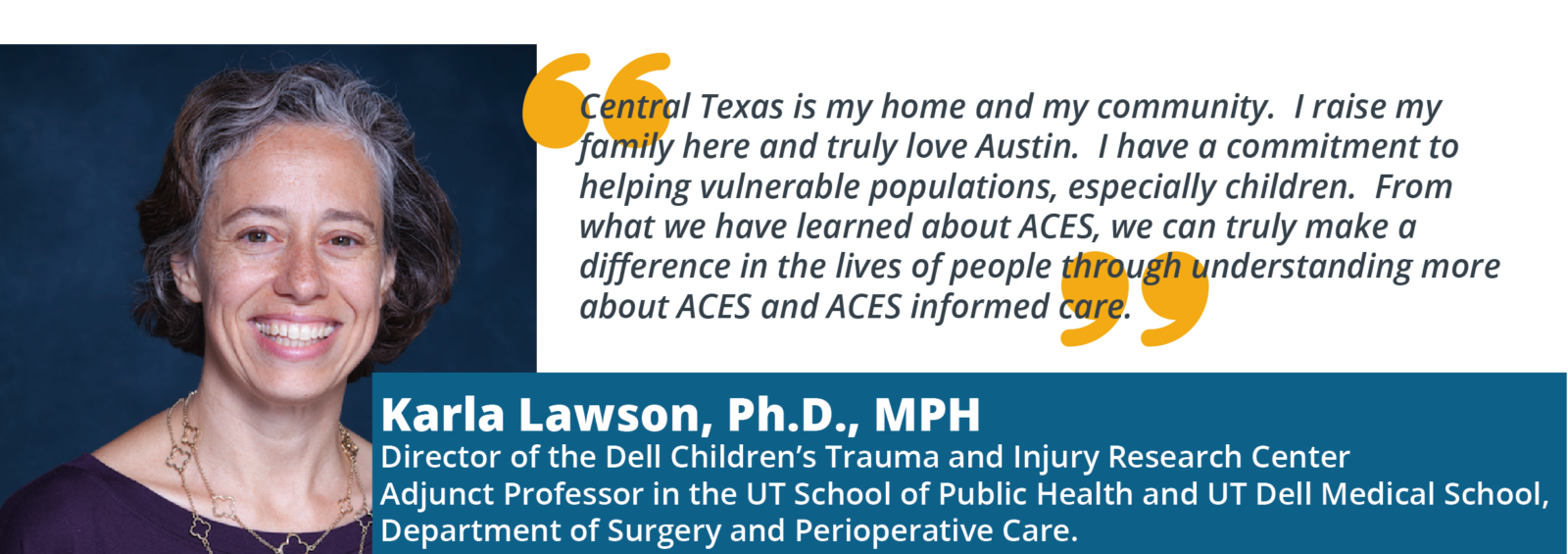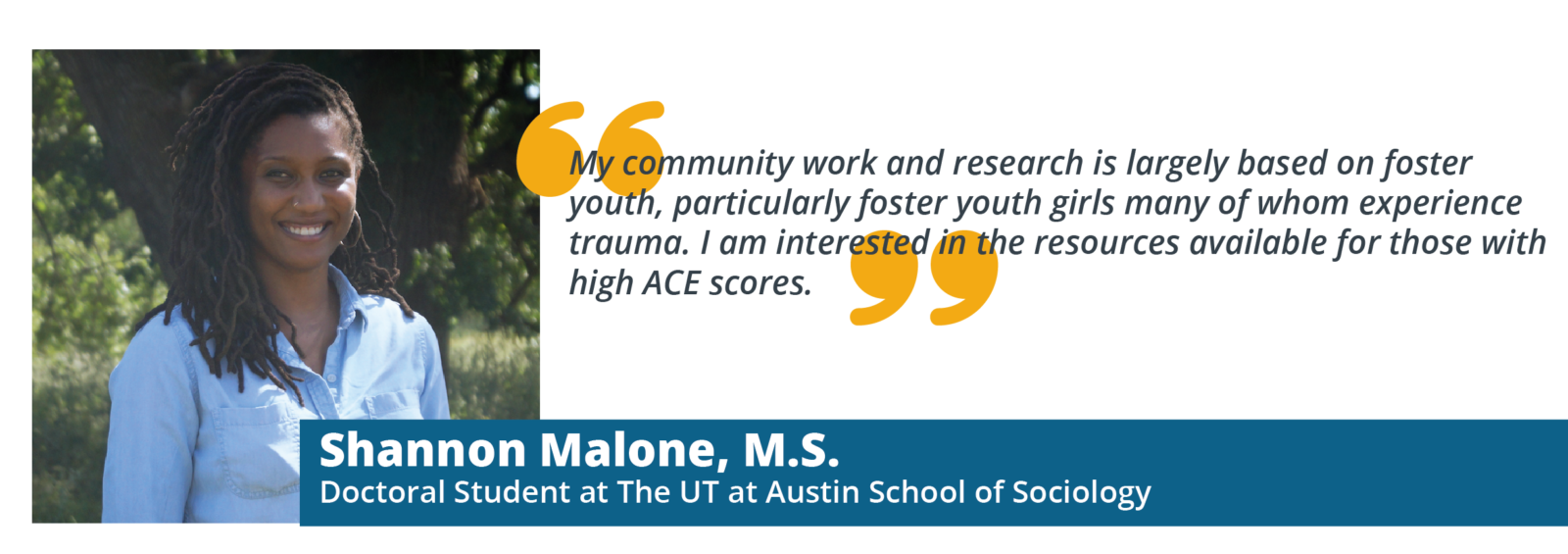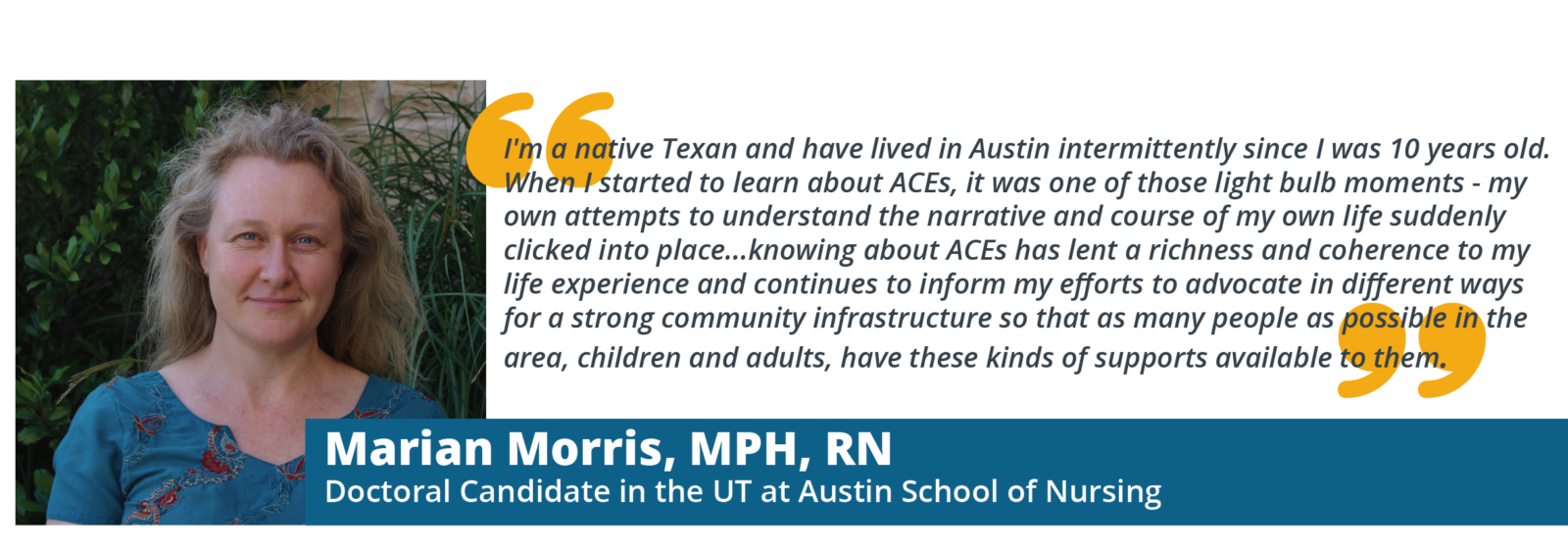How do you prevent Adverse Childhood Experiences (ACEs) in Central Texas?
By Kate McKerlie & Beth Gerlach
Are you one of the 2.5 million people that have viewed Dr. Nadine Burke Harris’s TEDTalk describing how childhood stress can lead to lifetime disease?
The attention to Adverse Childhood Experiences (ACEs) is growing in the news, but what exactly are ACEs? The CDC-Kaiser ACE study, a retrospective, large-scale study of how ACEs are related to adult health outcomes has changed our basic understanding of how the earliest stressful experiences in our lives can shape us into the adults we become later in life. ACEs include childhood abuse and neglect, as well as, household dysfunction like parental substance use, mental illness, domestic violence and parental loss. These experiences have been strongly linked to negative health behaviors such as smoking, alcohol and drug abuse, lack of physical activity, and even missed work. Obesity, suicide, heart disease, and cancer are also linked to possible risk outcomes. It has also been shown that there is a dose-response relationship between these outcomes and ACEs, meaning the more ACEs a child experiences the more likely they be at risk for negative health outcomes later on in life.
Over the past 20 years, it’s been found that the prevalence of ACEs in the general population is too high. In the United States, nearly one-quarter of all adults have three or more of these ACEs. The first ACEs study was published in 1998, which slowly sparked new initiatives to address the symptoms of ACEs (abuse, disease and addiction) but there now has been a movement to address the cultural drivers of ACEs to not only stop symptoms from forming but address the conditions in communities that allow for ACEs in an effort to prevent them.
An increasing number of service for children and families are implementing ways to be “trauma-informed” which not only strives to create content that realizes and recognizes the impact and potential of participants’ trauma but directly addresses it by integrating the existing knowledge we have on trauma and actively seeks to avoid re-traumatization due to the intervention itself.
One area with developing emphasis on preventing adverse childhood experiences is in pediatric healthcare. A number of pediatric practices around the country are examining ways to screen and intervene with ACEs. The American Academy of Pediatrics has strongly encouraged pediatricians to address ACEs in routine medical care. This involves an important shift in focus from the child to the parent/caregiver in order to help them protect children from exposure to chronic adversity and build resilience.
In order to explore strategies for supporting this effort, the Pediatric Trauma-Informed Research & Care Collaboration (PTIRCC) a partnership of several local organizations including the Texas Institute for Child & Family Wellbeing and Dell Children’s Trauma and Injury Research Center released a survey to explore the integration of ACE-informed practice among medical professionals in the Central Texas area. They are particularly interested in how routine medical practice can support new and expectant parents and caregivers who experienced trauma themselves in an effort to reduce the inter-generational transmission of trauma and help them create a safe environment for their children. “One of the first steps in our efforts is to understand healthcare provider’s knowledge, comfort, confidence and capacity to address adverse childhood experiences and trauma in their practice settings,” says Beth Gerlach, a member of the team conducting the study.
In 2014, 66,572 children and teens were confirmed victims of child abuse and neglect in Texas. 79% of those cases, the perpetrator was the child’s parent, and 7,509 of those children were confirmed victims of child abuse in Central Texas. Amanda Barczyk, another team member, states, “I have lived in many communities across the country and each has been unique in their needs, barriers, and resources. Central Texas has a lot of motivated people wanting to make a change in the area of ACEs and one of our aims is to catalyze this momentum to help vulnerable children and their families.” Because ACEs are such a widespread issue that influences both mental and physical outcomes the team formed to conduct this study is an interdisciplinary group of students and professionals from social work, public health, nursing, and medicine. The ultimate goal of the project is to increase the use of “ACEs screening in healthcare and the development of ACEs-informed and trauma-informed healthcare. Physician involvement in ACE Response is key to preventing high-cost ACE consequences and breaking cycles of intergenerational transmission,” says Heather Larkin Holloway, Ph.D. “[An] ACE response calls for more inter professional collaborative work where we integrate services to support the whole person.”
The survey was sent out to medical providers that serve children, families and expectant parents in the Central Texas area. The study is still collecting data, but the next steps will be to use the survey findings to begin intervention planning and pilot an intervention for local medical providers which will provide them with ACEs related education and support they need. The group presented the development of the needs assessment and some preliminary findings at the 2016 Conference on Adverse Childhood Experiences Pediatric Symposium last week.
Not only does this study strive to increase collaboration between different types of professionals to address ACEs holistically, but the study’s team puts this goal into practice, coming from a diverse array of professional backgrounds. Learn more about Central Texas ACEs NA team what they have to say about ACEs in our community:
